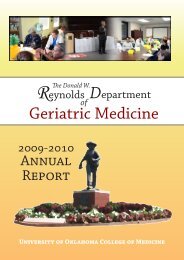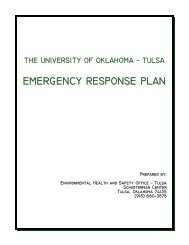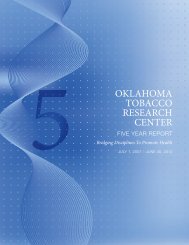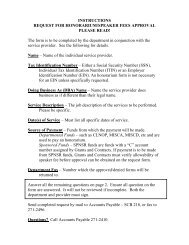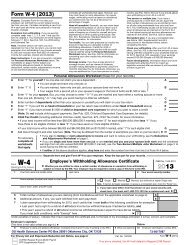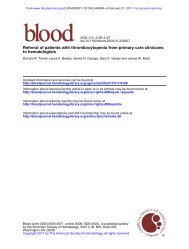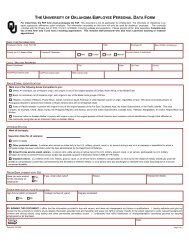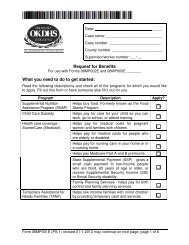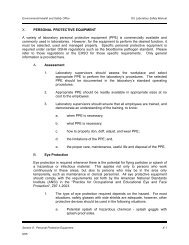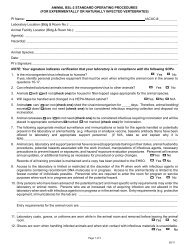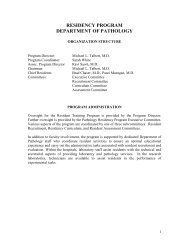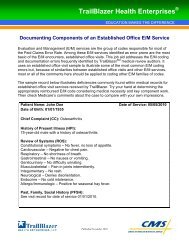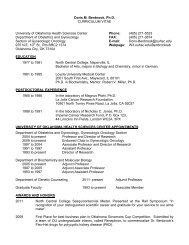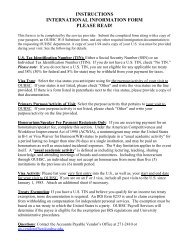The Unofficial Guide to First Year - University of Oklahoma Health ...
The Unofficial Guide to First Year - University of Oklahoma Health ...
The Unofficial Guide to First Year - University of Oklahoma Health ...
Create successful ePaper yourself
Turn your PDF publications into a flip-book with our unique Google optimized e-Paper software.
UNOFFICIAL GUIDE<br />
Principles <strong>of</strong><br />
Clinical<br />
Medicine<br />
SECTION<br />
D<br />
a.k.a: PCM<br />
Hours: 90<br />
When it Hits: All year<br />
Course Direc<strong>to</strong>r: Dr. Rhonda A. Sparks, FMC 2615, 271-7827<br />
"Something needs <strong>to</strong> be<br />
done about these<br />
lawyers." -- an<br />
Principles <strong>of</strong> Clinical Medicine is an introduction <strong>to</strong> the medical pr<strong>of</strong>ession. It<br />
will be one <strong>of</strong> the few chances <strong>to</strong> get a taste <strong>of</strong> what you are truly working for by<br />
actually going around with a doc<strong>to</strong>r and seeing patients. It is a breath <strong>of</strong> fresh air<br />
and will remind you why your body is gradually taking the form <strong>of</strong> your desk<br />
chair. <strong>The</strong> focus <strong>of</strong> the 1 st year <strong>of</strong> PCM is <strong>to</strong> make you more comfortable in<br />
engaging with the patient while learning the basics <strong>of</strong> interviewing and<br />
taking a his<strong>to</strong>ry. Most will tell you that being able <strong>to</strong> develop a successful<br />
doc<strong>to</strong>r/patient relationship is the most important part <strong>of</strong> being a doc<strong>to</strong>r,<br />
(unless you go in<strong>to</strong> something like Forensic Pathology where it will be more<br />
<strong>of</strong> a silent relationship.)<br />
GENERAL INFORMATION:<br />
“To study the phenomena <strong>of</strong> disease without books is <strong>to</strong> sail an uncharted sea,<br />
while <strong>to</strong> study books without patients is not <strong>to</strong> go <strong>to</strong> sea at all”—Sir William<br />
Osler. Well, thanks <strong>to</strong> PCM, you first-years can prepare <strong>to</strong> set sail on a rather<br />
well charted sea. PCM will introduce you <strong>to</strong> the human side <strong>of</strong> medicine and<br />
end up being a nice break from reading Chung’s book for the fifth time. <strong>The</strong><br />
class meets in the modules once a week, with half <strong>of</strong> the mod meeting on<br />
Tuesday afternoon and the other half meeting Thursday afternoon (this is good<br />
– it means you get at least one afternoon <strong>of</strong>f per week). Led by a real-life<br />
physician (not just someone who plays one on TV), you will practice your<br />
interviewing skills on simulated patients and will receive constructive (well…most<br />
<strong>of</strong> the time) feedback from your fellow mod-mates. Respect the fact that<br />
intensive learning is happening in the mods these afternoons; be sure <strong>to</strong> stay out<br />
<strong>of</strong> them when it is not your assigned afternoon (go do something fun instead).<br />
During the year, you will go on three, four <strong>to</strong> five-week rotations in<br />
which you will shadow practicing physicians (instead <strong>of</strong> meeting in the mods).<br />
During orientation, you’ll get <strong>to</strong> write down a few medical specialties that<br />
interest you. Most students will shadow physicians in the specialties they request<br />
along with at least one primary care rotation (Family Medicine, Internal<br />
60




